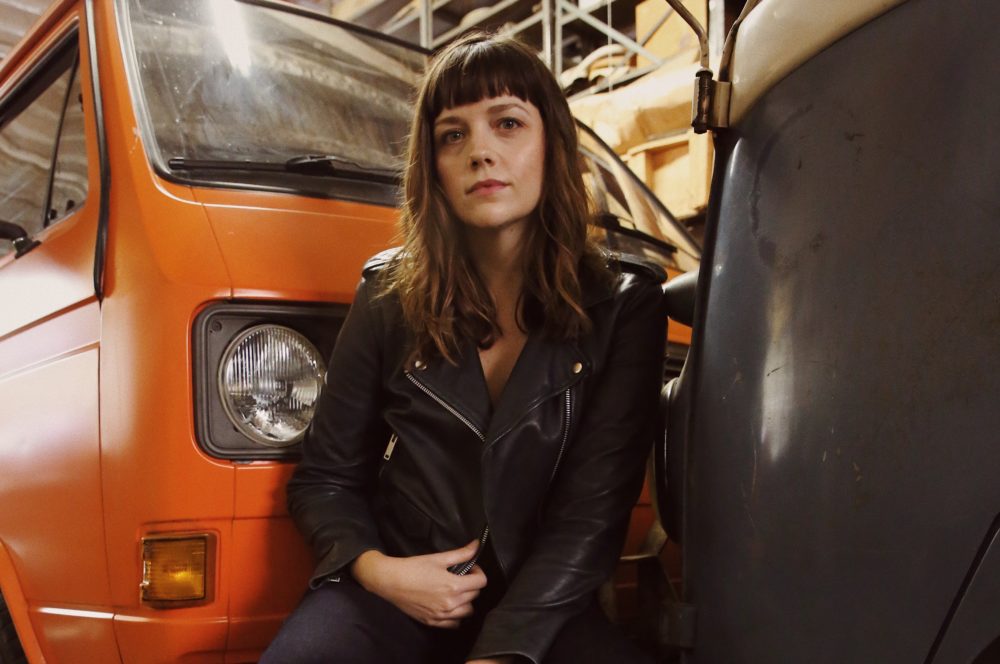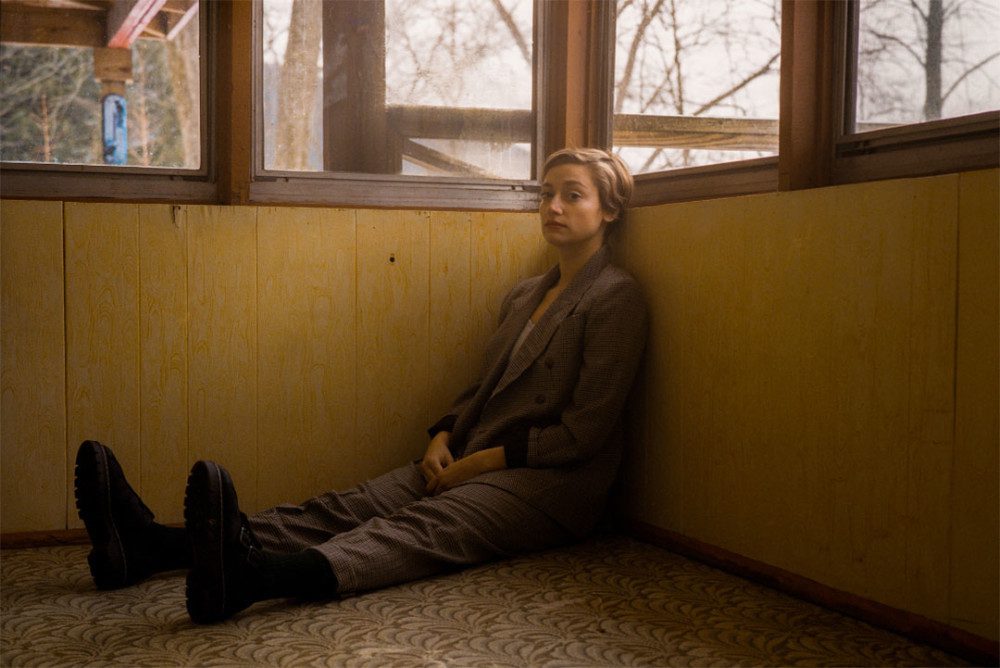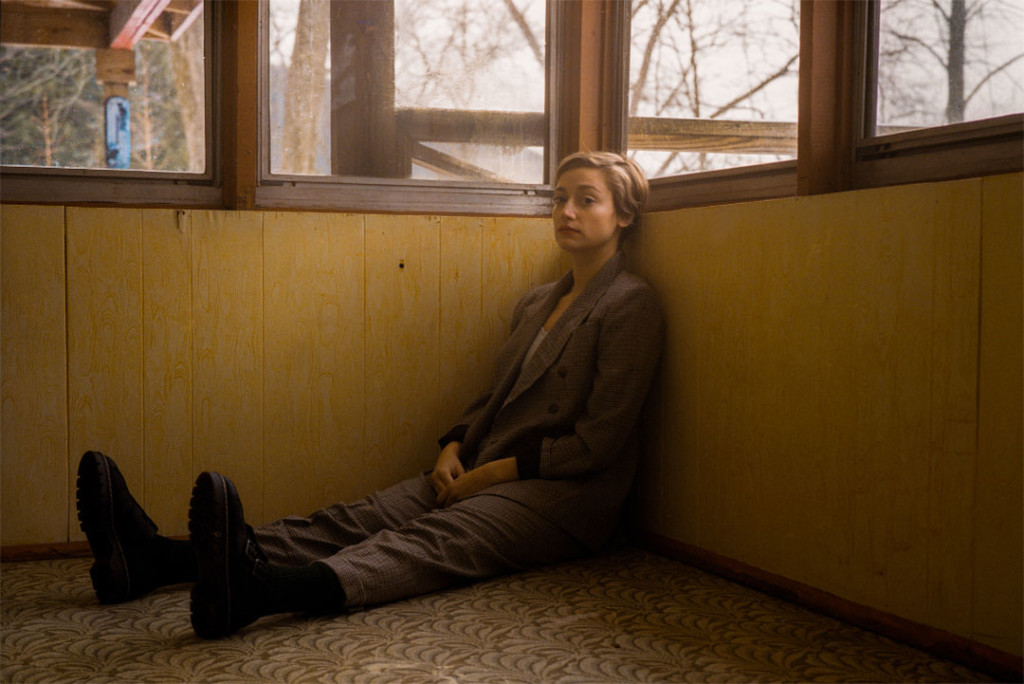

“I’m not ready for the big time, baby,” sings indie-folk artist Lesley Barth on “Lower East Side,” the opening track of her forthcoming sophomore album, Big Time Baby. Having co-produced the album with Joe Michelini from the band American Trappist, the follow-up to Barth’s 2017 debut LP Green Hearts may prove otherwise when it arrives May 15th. The album explores themes of vulnerability and isolation, and details different paths for rebuilding your life and unmasking your true self along the way. We are excited to premiere her second single off the album, “Nashville,” exclusively on Audiofemme.
“It was empowering to find out what the songs require, and have much more of a hand in the vision of the songs this time around,” Barth says, when I ask what it was like to help produce the album. As we talked, her husband and fellow musician Chuck Ramsey is playing music on the other side of their New York apartment, where they’ve lived for the past nine years. They met when they both lived in Philadelphia and were teaching music lessons, which Lesley still does, although virtually these days. “There’s an energy and hustle to New York that we love – it’s easy to be a creative person here. People take you seriously.”
Her first seven years in New York were spent at a corporate job, relying on its predictability and stability while also trying to fit writing and playing music into her schedule. Struggling to balance full-time work and creative side projects led her to reconsider if she was “in a place where I needed to be.” Barth had a weighty decision she needed to make, and didn’t really “have a plan at all” other than wanting to move toward music as her full-time career path. She was facing the great fear that tries to prevent anyone from changing, and yet she was able to boldly follow a sink-or-swim mentality: “If you build yourself a boat, you’re going to go back to the mainland. But if you don’t build the boat, you’ll figure it out on the island.” Trading an office for a stage has paid off for her, as she’s built up her audience in an incremental fashion. Her connection with her listeners has grown in many ways in the past few years, including through her Patreon community, where she has shared original songs and offered monthly virtual concerts since 2017.
One of the unique ways she challenged herself during this transitional time in her career was to write thirty songs in thirty days to celebrate her thirtieth birthday. “Nashville” was one of the songs that survived the experiment, and became one of her favorites to play live. The narrative is based on a guy her husband had played music with in New York, who was “playing cover guitar at this late night bar/with his drawl and his cowboy hat” – longing to play country songs, but not quite bold enough to express his true self in a noisy East-coast bar. “He bought a leather jacket to try and blend in/but his steel-toed boots and sadness gave him up,” Barth continues, as the song complements this tension by moving from finger-picked acoustic guitar into a more full-band sound with synthy drums and strings. As Barth spent more time with this song, she realized that its narrative also applied to herself, and how out of place she felt in the corporate world. It helped her to make that final leap into the unknown experience of being her own boss.
Barth released her first single from Big Time Baby, “Woman Looking Back at Me,” a few weeks ago, which also delves into the search for an authentic self-image, but through a lulling, jangly disco beat. She wrote this after “trying to detach a bit from my inner critic and figure out who is living rent-free in my head.” Especially during this strange time, with the external world quieted down, many of us have been compelled to examine the internal, less pretty parts of ourselves. It can be disorienting to deal with all of our fractured selves while also just trying to exist. Barth encourages us to approach this task through a mode of curiosity rather than judgment: “And I’ve looked at this square so long/just thinking it’s a triangle/And I’ve looked at my face so long/craning my neck for the right angle/But who is the woman looking back/at the woman looking back at me?”
The album as a whole explores what it means to be vulnerable, to take emotional and vocational risks, and to trust yourself to be able to deal with the uncertainty and hurt that comes from living in an imperfect world. Barth’s strong, clear voice shines through, mostly showcased by sparse, jazzy instrumentation. “If love doesn’t change you/then loneliness will” she sings midway through the album, before moving on in “Making Decisions” to propose that loving someone is the ultimate proof that free will exists, that you have to choose it every day. And that having the stability of being partnered with someone who also makes that choice can help sustain you when the rest of your choices seem scary or painful.
These songs are mostly monologues, but transition into a duet with Ramsey in the energetic pop song “Preacher,” which Barth says was the last song they recorded in the studio. It definitely has a celebratory feel, which may seem strange for a break-up song, where both sides of the story examine their infatuation with each other, then merge their nostalgic thoughts in the chorus to see if they match up. “Thought I saw you yesterday/but it was just some guy preaching on the train/interrupting the peace of weary commuters” vividly describes the way you can see a glint of something in any stranger’s face that reminds you of a person you’ve lost, even if it’s a version of that person that only exists in your mind.
Like most musicians right now, Barth has had to re-calibrate the way she operates, most likely having to cancel the summer tour for this album, as well as an album release show she’d planned. When I asked how she’s coping with this new altered reality, she says, “It’s like watching a natural disaster in slow motion. And there’s no time or space to grieve, because people normally grieve by coming together. But I’ve been listening to a lot of my friends’ music, it helps me feel close to them.” She said this transition to solely playing music online “has been super strange, and will probably only get stranger” in the days ahead, but that she’s been brainstorming creative solutions in looking for ways to celebrate her accomplishments anyway.
This positive mindset ties in to the album closer, “Something Good,” which she says “empowers us to allow ourselves to feel good and to make good choices even within a tough situation.” It challenges us to take a chance and, instead of wallowing in our flaws, to choose to focus on happiness instead. It can be a lot easier to give others advice to be patient with themselves than to follow that advice in your own life, but the song encourages us not to lose hope and to honor each milestone crossed along the way.
“It feels weird releasing music right now, but it would feel weird doing anything. So it also feels nice to have something to offer up to people,” Barth says. As she began to share singles from album, Barth says she realized that “perfectionism is irrelevant. It’s also impossible right now – there’s no rulebook anymore. We’re all creating our own rules.” All the characters and versions of self in the album seem to agree, and they give us directions about how we might navigate the unknown days ahead in a gentler headspace.
Follow Lesley Barth on Facebook for ongoing updates.



